#Mobile Data Abroad
Explore tagged Tumblr posts
Text
Unlock a world of seamless connectivity with eSIM Cards. Stay connected while traveling globally without changing physical SIM cards.
Say goodbye to roaming charges and experience hassle-free communication wherever you go. Your passport to instant, affordable, and borderless connectivity awaits – explore the world with eSIM Cards.
Click on the Link for More Info.
#Airalo eSIM#Travel SIM Cards#International Roaming#Global Connectivity#eSIM Technology#Travel Tech#Digital Nomad#Travel Essentials#SIM Card Alternatives#Airalo Review#Mobile Connectivity#Roaming Solutions#Tech for Travelers#Digital Travel#Mobile Data Abroad#Virtual SIM#Airalo eSIM Plans#Travel Gadgets#eSIM Benefits#Travel SIM Comparison#Global Roaming#Airalo App#Mobile Network Abroad#SIM-Free Travel#Affordable Roaming#eSIM vs. Physical SIM#Tech for Jetsetters#International Data Plans#Mobile Connectivity Solutions#Airalo Coverage
0 notes
Text
How Custom Software Development Transforms Modern Businesses: Insights from CodEduIn an era dominated by rapid technological advancements, businesses are under immense pressure to stay competitive, efficient, and customer-focused. Off-the-shelf software, while useful, often falls short in addressing the unique challenges and dynamic needs of individual businesses. This is where custom software development steps in—a solution tailored specifically to meet the requirements of a business.
CodEdu Software Technologies, based in Cochin, Kerala, specializes in creating innovative, customer-centric software solutions that empower businesses to streamline operations, improve productivity, and enhance customer experiences. In this blog, we’ll explore how custom software development is transforming modern businesses and why partnering with CodEdu can be a game-changer.
What Is Custom Software Development? Custom software development involves designing, developing, and deploying software solutions tailored to meet a business's specific requirements. Unlike generic, off-the-shelf software, custom solutions are built from the ground up to align with a company’s processes, goals, and challenges.
This personalized approach allows businesses to create tools that integrate seamlessly with their existing operations, enhancing efficiency and providing a competitive edge.
The Key Benefits of Custom Software Development
Tailored to Specific Business Needs Custom software is designed to address a company’s unique requirements. Whether it’s automating a workflow, integrating with other tools, or solving specific challenges, the solution is built to fit seamlessly into the business ecosystem.
For example, an e-commerce business may require a software system that combines inventory management, personalized customer recommendations, and a secure payment gateway. Off-the-shelf software may provide one or two of these features but rarely all in an integrated manner.
Enhanced Efficiency and Productivity Custom software eliminates redundancies and streamlines operations. By automating repetitive tasks and integrating seamlessly with existing tools, businesses can significantly reduce manual effort and focus on core activities.
CodEdu has worked with several businesses to create custom solutions that enhance efficiency. One notable example is a manufacturing client who needed real-time tracking of production cycles. The tailored solution reduced delays and optimized resource allocation, saving the client both time and money.
Scalability for Future Growth One of the major limitations of off-the-shelf software is its inability to scale. As businesses grow and evolve, their software needs change. Custom software, on the other hand, is designed with scalability in mind.
CodEdu’s solutions are built to grow alongside businesses, allowing for easy updates and additional features as new challenges and opportunities arise.
Improved Security Data security is a top concern for businesses today. Custom software allows for the integration of advanced security features tailored to the specific vulnerabilities of the organization.
Unlike generic solutions that use standard security protocols, custom software incorporates unique safeguards, making it harder for malicious actors to breach the system.
Cost-Effectiveness in the Long Run While the initial investment for custom software may be higher than purchasing off-the-shelf solutions, it offers significant savings in the long run. Businesses avoid recurring licensing fees, third-party tool integration costs, and inefficiencies caused by mismatched software capabilities.
Real-World Applications of Custom Software Development Custom software development is revolutionizing industries by offering solutions that address specific operational challenges. Here are some examples of how businesses are leveraging tailored solutions:
E-Commerce Industry E-commerce companies face unique challenges, such as managing large inventories, providing personalized customer experiences, and ensuring secure transactions. Custom software can integrate inventory management systems, CRM tools, and AI-driven recommendation engines into a single platform, streamlining operations and boosting sales.
Healthcare Sector The healthcare industry requires solutions that ensure patient confidentiality, streamline appointment scheduling, and manage medical records efficiently. Custom software allows healthcare providers to deliver telemedicine services, maintain compliance with industry regulations, and improve patient outcomes.
Education and Training Educational institutions and training academies are leveraging custom Learning Management Systems (LMS) to provide personalized learning experiences. CodEdu has developed platforms that enable online assessments, real-time feedback, and interactive learning tools for students.
Logistics and Supply Chain Logistics companies require software that provides real-time tracking, route optimization, and automated billing. CodEdu has partnered with logistics providers to build solutions that reduce operational costs and enhance customer satisfaction.
How CodEdu Approaches Custom Software Development At CodEdu Software Technologies, we believe in a collaborative, customer-centric approach to software development. Here’s how we ensure the delivery of high-quality solutions:
Understanding Business Needs Our process begins with a detailed consultation to understand the client’s goals, pain points, and operational workflows. This ensures that the solution aligns perfectly with the business’s requirements.
Agile Development Methodology We adopt an agile approach to development, breaking the project into smaller, manageable phases. This allows for flexibility, regular feedback, and timely delivery of the final product.
Cutting-Edge Technology Our team leverages the latest technologies, including AI, machine learning, cloud computing, and blockchain, to deliver innovative and robust solutions.
Ongoing Support and Maintenance Software development doesn’t end with deployment. We provide ongoing support and updates to ensure the solution remains effective as the business evolves.
Future Trends in Custom Software Development The world of custom software development is continuously evolving. Here are some trends that are shaping the future:
AI and Machine Learning Integration Artificial Intelligence (AI) and machine learning are enabling businesses to automate processes, predict trends, and provide personalized customer experiences. From chatbots to predictive analytics, these technologies are transforming industries.
Cloud-Based Solutions Cloud computing is revolutionizing software development by offering scalability, accessibility, and cost efficiency. Businesses are increasingly adopting cloud-based custom software to enable remote access and collaboration.
IoT-Driven Solutions The Internet of Things (IoT) is creating opportunities for custom software that connects devices and collects data in real-time. This is particularly beneficial in industries such as healthcare, logistics, and manufacturing.
Low-Code and No-Code Platforms Low-code and no-code platforms are simplifying the development process, allowing businesses to create custom software with minimal technical expertise. While not a replacement for traditional development, these platforms are enabling faster prototyping and iteration.
Why Choose CodEdu for Custom Software Development? CodEdu Software Technologies stands out as a trusted partner for custom software development. Here’s why:
Experienced Team: Our developers bring years of experience in crafting innovative solutions for diverse industries. Customer-Centric Approach: We prioritize your business goals, ensuring the software delivers real value. Proven Track Record: With a portfolio of successful projects, CodEdu has earned a reputation for delivering quality and reliability. End-to-End Services: From consultation to development and post-deployment support, we handle every aspect of the project. Conclusion Custom software development is no longer an option but a necessity for businesses aiming to stay competitive in today’s digital landscape. It empowers organizations to streamline operations, enhance security, and deliver exceptional customer experiences.
CodEdu Software Technologies, with its expertise in innovation and customer-centric solutions, is the ideal partner to help businesses harness the power of custom software. Whether you’re a startup looking to establish a strong foundation or an established enterprise aiming to optimize operations, our tailored solutions can drive your success.
Ready to transform your business? Contact CodEdu Software Technologies today and let’s build the future together.
#Custom Software Development#AI Software Solutions#Cloud Services#Mobile App Development#Web App Development#UI/UX Design#Quality Assurance & Testing#Front-End Development#Web Maintenance#Python Full Stack Training#Data Science Courses#Digital Marketing Certification#Artificial Intelligence Training#Internship Opportunities#Experience Certificates#100% Placement Assistance#Gap-Filling Courses#Study Abroad Preparatory Programs#Professional Development#Trending Technologies#Industry-Ready Skills#Job-Oriented Trainin
1 note
·
View note
Text
o dam
#uh idk if i can use th internet when im at germany#cuz idk if i hav the abroad mobile data thingymabob#welp#i do hav stuff to draw n do tho so:)
0 notes
Text

I used my mobile data too close to the sun.
#uh oh#i was supposed to have limitless data no one told me it doesnt count in other countries#but since when IS 500mb the 20% of 33GB?#fuck you yettel#i pay for limitless mobile data and you only give me 33 gb abroad?
1 note
·
View note
Text
Welcome to a new privacy-first initiative challenging the digital identity status quo, urging a sharp turn away from the surveillance-ready infrastructure embedded in mobile driver’s licenses.
The campaign, called No Phone Home, brings together a broad alliance of civil liberties groups, privacy experts, technologists, lawmakers, and public officials who are resisting the ways digital IDs compromise people’s rights.
What’s fueling the campaign is concern over how mobile driver’s licenses, increasingly adopted in the US and abroad, are built atop a technical framework that allows them to silently transmit data back to issuing authorities. While this function may not be active by default, it exists; and that, privacy advocates argue, is a serious vulnerability.
Even if unused, if the architecture allows for data to be sent back to government servers, it eventually will be the campaign’s statement warns.
15 notes
·
View notes
Note
Hello, I'm sorry to bother you. If you would share the word about what's currently happening in Bangladesh, I would really appreciate it. I've been trying to talk about it but word isn't going around enough.

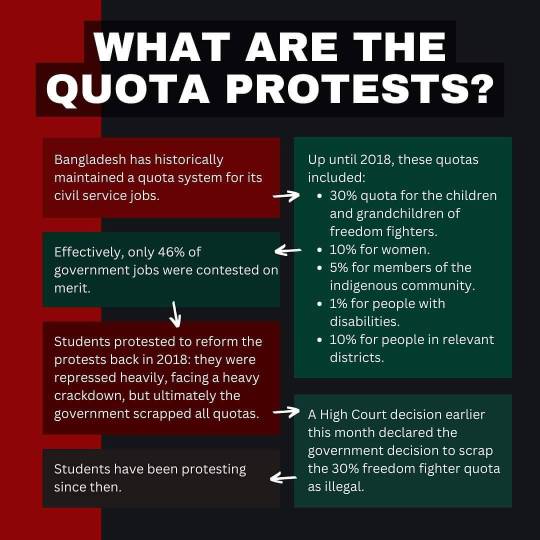


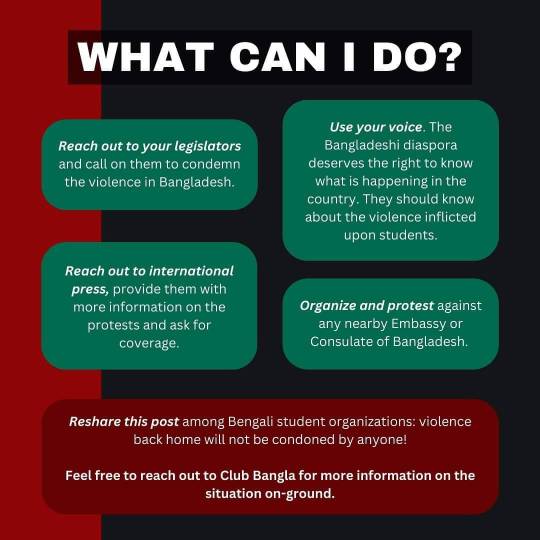


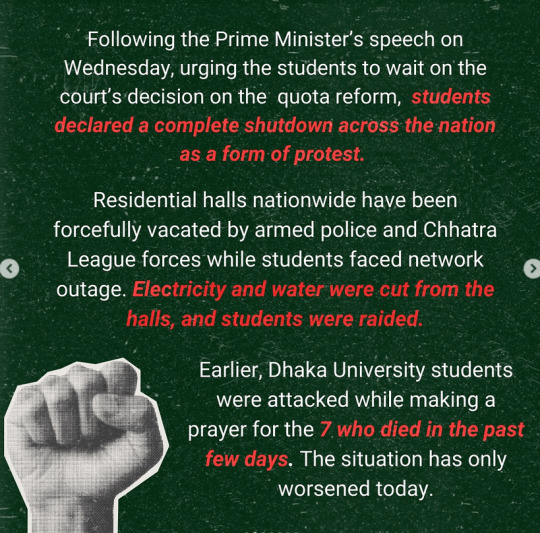
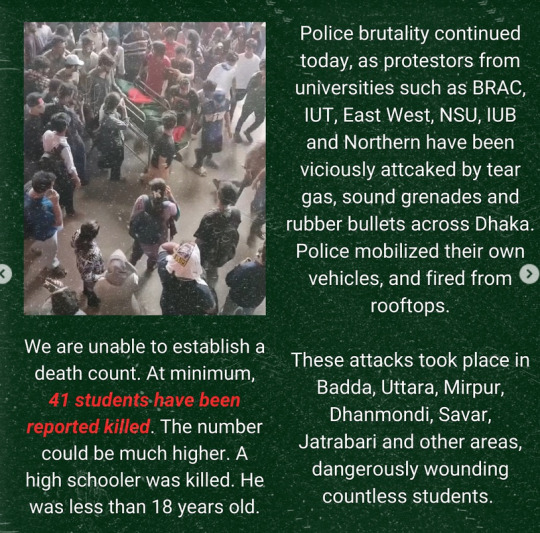
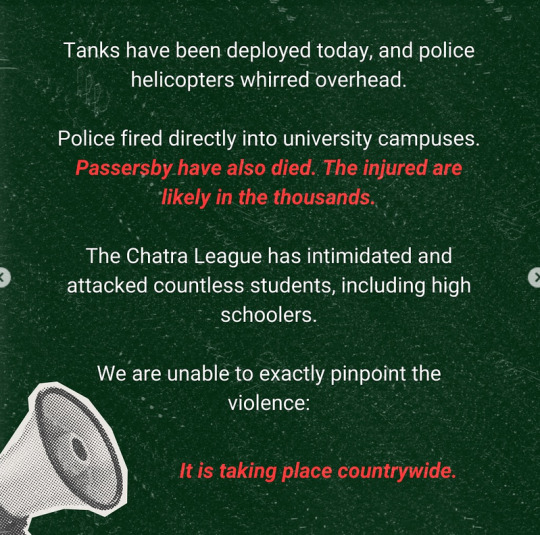
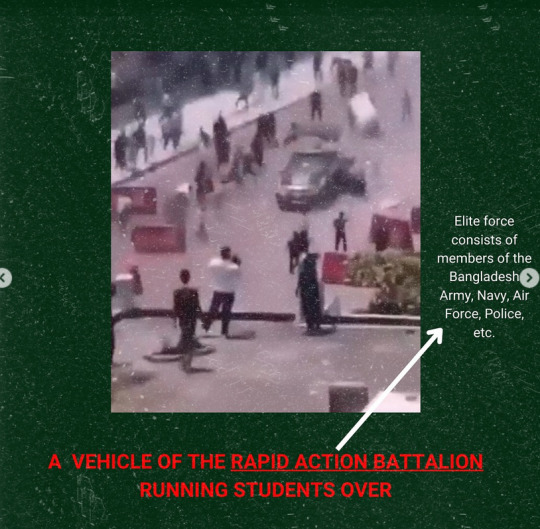
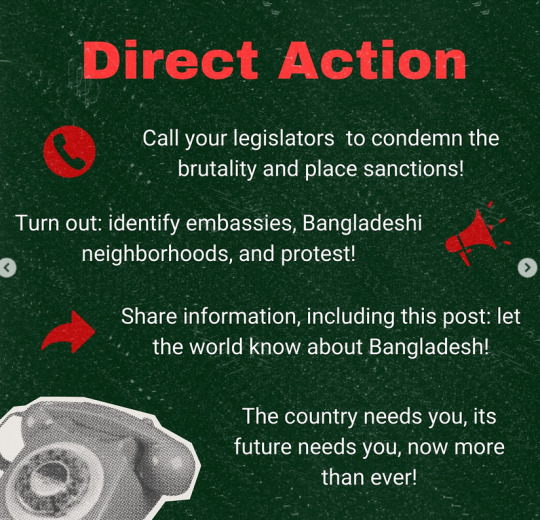

https://www.instagram.com/cubangla/
On 18th July, Friday, there was a near total network blackout. Internet and mobile data have been nearly fully shut down, and mobile networks have been restricted heavily as well. The government has opened fire on protestors and civilians alike. We, as Bangladeshis living abroad, can barely contact our friends and family back in the country. Last update was an ongoing curfew going on, with threat of open fire on anyone seen outside during it.
Please help spread the word.
I'm currently visiting family so I hadn't seen this, but this is real and this is happening.
https://www.washingtonpost.com/world/2024/07/19/bangladesh-demonstrations-police-hasina/
85 notes
·
View notes
Text
Is slovenia weird/outlier by having enough data in our mobile phone plans that we DON'T need free wifi everywhere we go?
I had 8GB of data in my former data plan, now I have even more, and I went for a plan on the cheap side. I never come even close to using all of it in a month (but then again I don't watch whole movies on it)
Every time I travel abroad, every hotel and restaurant and coffeeshop brags about free wifi, I assume it's a huge selling point? But I never need it, plus it's a safety hazard. My plan includes 2GB of data abroad inside the EU
141 notes
·
View notes
Note
ngl they were pretty famous in 2017, not like household names level famous, but definitely more famous than they are right now. i feel like even if u were just a casual youtube watcher and social media user, u at least heard of their names, and the phandom at the time was also huge (in part because, like dnp mentioned in their mukbang video, a lot of ppl who were generally into british youtube also watched them, whereas now, it’s mostly us really dedicated phannies who have stuck through the hiatus). also, although they had left the bbc by then, they ofc still had that cred attached to them for having been bbc presenters and brits hosts (granted, £250,000 is still Wilddddd, but yeah i’d say they were pretty famous then, even if a good portion of that was like Residual fame from the insanity of 2014-2016)

OH MY GOD YOU GUYS I'M SO SORRY
I GOT THESE AND STARTED RAMBLING AND THEN WANTED TO LOOK SOMETHING UP AND REORGANISE THE POST AND THEN I SAVED THIS AS A DRAFT AND THEN. FORGOT. FOR A WEEK please forgive me 😭😭😭
Um. Do you still want the unstructured rant from a week ago. I'm not even gonna reread it, I'll just post it as it is including last week's tags 😭😭😭
Ok this sent me down a rabbit hole into the most subscribed to youtube channels of 2017, the post-brexit economy of the UK, tinder's revenue history, tinder's marketing budget history, youtube's revenue history (google "2017 youtube advertiser boycott" for a blast from the past), and way too little phandom and Fandom history so I still feel like I'm missing pieces lmao
The thing is... I distinctly *remember* seeing comments that dnp were past their zenith during ii? Granted I wasn't on phannie tumblr at the time so this must've been on twitter or idb, where people have always been more pessimistic I guess. But it's not like this was a lifetime ago, I know where I was and what I did in 2017 (secretly watch dnpg during a uni field trip while everyone else was getting drunk and hooking up with the professors) (until they realised i had mobile data even though we were abroad, which was when they started asking me if we could all watch skam on my phone) (bc apparently that was what the 20 year olds were into lmao) (which is also how i know nobody used tumblr anymore bc i found the pirated skam uploads through a doc linked on tumblr, while everyone else was trying to catch the youtube uploads before they got taken down after 2 hours), so I feel like I can't be misremembering it that much? Like, I remember everyone (irl and on twitter) talking about conventional "youtubers" (as in, person who talks into a camera without a large production company behind them) in these mind-bogglingly reductionistic terms after pewdiepie came out as a racist and then again after logan paul filmed that dead body (tbf that was in december 2017, so definitely after the tinder spon), and I specifically found it so strange that it seemed like none of these commentators knew any other professional youtubers. Like the whole business model seemed so strangely more niche than it had a few years earlier? Like, in 2012 all my friends were watching Tyler Oakley or Jenna Marbles, and then by 2016 they had moved on to watch... Seth Meyers clips? On Youtube? Or, you know, Skam reuploads. Which is not what the platform was for at all, but there was this strange shift in content that wasn't *made* for youtube.
All this to say.... I guess the ad *could* have been that expensive, especially bc immediately after brexit inflation went up in the uk, so that probably also affected the numbers, depending on whether they got the deal with tinder uk or tinder us? I still feel like 2017ish wasn't a high point for youtubers specifically. Apparently influencer marketing only really took off in the mid-2010s though, so I guess it was also this liminal space of already-ftc-mandated-testimonial-declarations-hashtag-ad but not-yet-moved-all-the-budget-to-instagram? Idk it was a weird time. I wonder how it'll go in the next 10 years
#idk I'm not convinced the average youtuber has ever really been famous at all tbh#but imagine how many influencers a company tends to strike deals with#not that you need to be famous to be a successful testimonial#actually let's do the maths#i mean. match spent 340 million on advertising. let's say 250 million of that was for tinder#then let's say half of it was traditional advertising and the other half influencer spons#so you got 125 million for all the influencers. divided by 250k - ok tbf that's 500 people who on average get paid what dnp allegedly did#yeah. maybe you're right maybe it was that sum#dan and phil#phan#ask
9 notes
·
View notes
Note
Hello, I'm sorry to bother you. If you would share the word about what's currently happening in Bangladesh, I would really appreciate it. I've been trying to talk about it but word isn't going around enough.
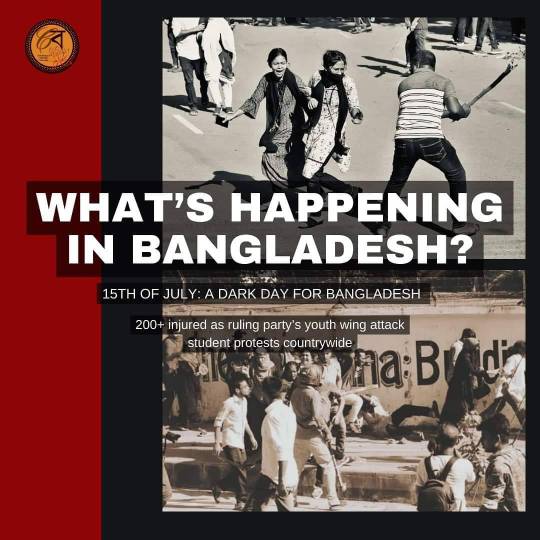




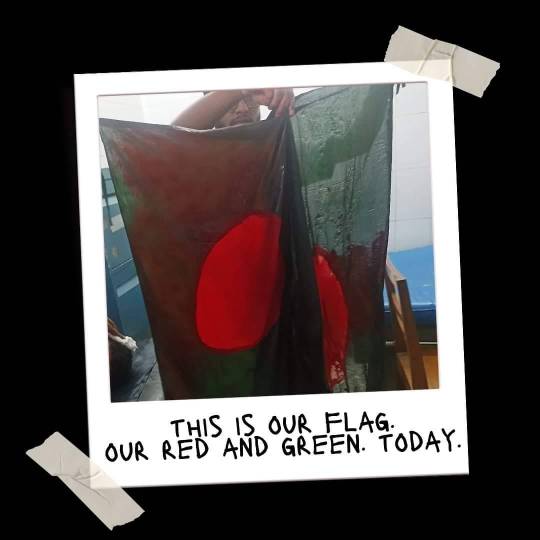
https://www.instagram.com/cubangla/
On 18th July, Friday, there was a near total network blackout. Internet and mobile data have been nearly fully shut down, and mobile networks have been restricted heavily as well. The government has opened fire on protestors and civilians alike. We, as Bangladeshis living abroad, can barely contact our friends and family back in the country. Last update was an ongoing curfew going on, with threat of open fire on anyone seen outside during it.
Please help spread the word.
I rbed another post with these pictures but I'll post this too!! I hope your family is safe
27 notes
·
View notes
Text
A detail about the Peacebreakers in Providence. (translated + spoilers)

Ministry of Foreign Affairs Overseas Research Department Field Survey Team/Peace Breaker Official activity period: 2098/04~2113/04
A unit that obtains and manipulates information useful to Japan from other countries. Its main mission is to enter other countries, gather information, carry out sabotage operations, and provide weapons and operational support to anti-government organizations who support the Japanese government. Regarding anti-government support operations, operations were carried out through domestic third-party organizations
(Example 1). It has been confirmed that it was provided to and expanded to the government and rebel forces of the former Southeast Asian Union (commonly known as SEAUN) (see corresponding data 04231 for details). Through "monitoring"derived from [...] The members were selected from among the soldiers who belonged to the Special Forces of the National Defense Force, based on the Sibyl System's advanced decisions, and from among them, those who had a particularly strong sense of national pride were selected. Establishment: Wave After its establishment, the company did some original work. Main strategies and execution records. 2099_Conflict within the Union of Southeast Asia
2111_Rebellion in the Republic of South Asia 2112_Operation Footstamp 2113_Kona Island independence group reduced cropping Involved in etc. For details, see 67721 data
In June 2118, the decision was made to dismantle the unit, and in the same month, the whereabouts of the unit commander and training staff went missing.
In October 2118, independent activity was confirmed, and it was completely destroyed. To this day, it is said that its range has expanded to include Japan, Northern Russia, and the Russian Federation. Tonami is said to have been the general manager since the company's founding.

■ PB2098 type TUSIMA PS (Peacebreaker Armor) A powered suit that is standard equipment for the Peace Breaker Corps. It covers the head, upper body, and lower body, and is equipped with heavy armor and assist functions in each part. Increases the wearer's mobility by 1.25 times. Visibility is ensured by using cameras in front and behind the head to project images directly onto the eyes using internal scale projection sensors. It is also equipped with an infrared sensor and 3D prediction function MS2 as an option. It is possible to carry out operations without securing visibility even under conditions of poor visibility. Multi-type labeling function installed on the front of the waist
***
Sibyl itself is promoting conflicts to expand itself, and then denying asylum to the refugees which is why they're confined to Dejima/Kyushu. Sibyl lets MFA do the dirty work and it's obvious that Sibyl just turns a blind eye to this because it benefits their colonisation approach. I wonder what Kogami's thoughts will be when he comes to realise that his "democratisation" in Siam Reap (Psycho Pass Movie) was just a part of Sibyl's grand plan. Also Kona Island? Didn't Rutaganda and his mercenaries live on an island? The knowledge that Sibyl would let the world suffer, after having seen the true effects of it in his journey abroad and that probably every person he met or lost on his journey (including the people that Tenzing lost) was suffering due to Sibyl's duplicity. In Case 3 Novel, Frederica is investigating the Peacebreakers in Tibet-Himalaya and Garcia by extension. Honestly, Kogami Shinya seeing the horrors of war, trying to help people and then returning to become a cog in the System is a tragic enough ending for me. I guess this was the meaning of that painting in that room. (The Abyss, I assume?)

Anyhow, I'm on my fourth rewatch (first time with subs so thank god I can follow the dialogues), and Sibyl has a knack of grinding my gears (pun intended), I've come to despise the System as much as Kogami. I'll delve into a proper review later, for now just accept my ramblings. I have 10,000 thoughts on Akane too, who in this movie punched me right in the heart, honestly I don't know how Akane-chan is so strong. I admire her grit.
58 notes
·
View notes
Text
Silence, Siege and Persecution: Venezuela’s Media After the Elections
“Today I heard on the radio: ‘Our programming today will be 100% music, because music is a refuge, a safe place,’” economist Omar Zambrano tweeted a few days after the July 28th elections. In fact, for almost two weeks after the disputed results were announced by the National Electoral Council and spontaneous protests erupted throughout the country, most radio shows –including those with the largest audiences, such as journalists Shirley Varnagy’s and Román Lozinki’s– went off the air.
“These have been difficult weeks for all of us as citizens, including those of us who practice this profession”, Varnagy said in an Instagram post after two weeks of silence. “The circumstances force me to think very carefully about the words I say and write. I don’t live abroad, I’m inside.” Varnagy then announced she wouldn’t return to the radio until September 9th, more than a month after the presidential elections. Lozinski returned on August 26th. “I insist that these have not been easy days for those of us who make a living from the radio,” he said on an Instagram post announcing his return.
But the silence, the veiled messages, weren’t limited to Venezuela’s already highly-censored radio stations – of which more than 150 have been closed down by CONATEL, the government’s telecommunications agency, since 2022 according to the National Press Workers Union (SNTP).
As reports of detentions and passport annulments multiplied after the elections, the silence–usual in television, newspapers and most radio shows–suddenly swayed through social and online media too.
Journalists put their accounts private or altogether stopped tweeting, political podcasts halted and Venezuelan independent media started to publish articles without bylines (as we’ve been doing in Caracas Chronicles).
A week after July 28th, journalist Alonso Moleiro accurately described the ambiance: “The prevailing feeling is fear,” he wrote in the Spanish newspaper El País. “Politicians are hermetic. Interviews are canceled. People close to political leaders change their phone numbers. There is a huge hesitance in WhatsApp groups; Zoom conversations are rare. The police harass citizens looking for data on their mobile phones.”
The crackdown against the press ramped up before July 28th, when CONATEL ordered that public and private internet providers block a series of independent media, watchdogs and fact-checking websites. First, on early July, the government blocked anti-disinformation fact-checkers Es Paja, Cazadores de Fake News and Observatorio de Fake News alongside the media NGO Instituto Prensa y Sociedad de Venezuela (IPYS Venezuela) and VPN service Proton. Then, on July 22, the sites of watchdogs Medianálisis and VE Sin Filtro were blocked alongside independent media El Estímulo, Analítica and Runrunes.
During the same period, Nicolás Maduro repeatedly referred to foreign media agencies –including Reuters, AFP, AP, EFE and CNN– as “garbage” and “hitmen of untruthfulness.” His legislature speaker, Jorge Rodríguez, even engaged in an online brawl with APEX–the Foreign Press Association in Venezuela.
Then, the elections came. And detentions followed.
Since July 28th, 13 journalists and press workers have been detained in the country by state security forces, according to the SNTP (four have been freed, including one on parole). Three of them–including Ronald Carreño, a political prisoner with ties to opposition party Voluntad Popular who had been released last year as part of the US-Venezuela talks–were arrested for belonging to opposition parties. Other detained journalists including showbiz reporter Carmela Longo–who was released on parole afterwards, but charged with terrorism–, La Patilla journalist Ana Carolina Guaita in La Guaira, and photojournalist Deisy Peña in Los Teques, were taken for just doing their jobs.
“Our media outlet has a profile that is very different from the rest and we don’t do hard news,” says Irene (fake name), who works in a small Venezuelan digital outlet. “But in the end, as Carmela’s case shows, anyone can get in trouble for whatever reason now without you necessarily doing anything.” The pattern is changing. Before the elections, detentions were mostly focused on people helping the opposition campaign or participating in it. In fact, the three journalists detained before the elections–Gabriel González, Luis López and Carlos Julio Rojas–had ties to political parties or grassroots political movements. But, since July 28th, repression has drifted towards reporting-focused journalists.
The role of journalists in narrating the people’s rejection of the results announced by the CNE and the coverage on their veracity led to a “policy of silencing, of siege, of persecution” against the press, SNTP Secretary General Marco Ruiz says. Similarly, he says, there’s been a policy of silencing the coverage of protests and anti-government expressions.
And the July 28th elections have not only unleashed detentions. “We have recorded campaigns of hate and criminalization against journalists in different states like Aragua, Portuguesa, Carabobo, Zulia, Bolívar, Táchira,” Ruiz says, “Many of them are now in safekeeping. In other cases, we have had to use extraction procedures and they are outside the country because they were at risk of arrest.”
The situation has also changed the content and internal dynamics of Venezuelan outlets. “Everything we had planned to publish during the rest of the year is now paralyzed,” Irene says, “because now we are not publishing anything that doesn’t have to do with what’s happening, because we think there’s nothing more important.” Some of her colleagues, she says, have also stopped tweeting because of the emotional toll.
Similarly, outlets –including Caracas Chronicles– have faced difficulties to find sources willing to speak on the record or contribute with their analyses. “I can’t find voices willing to give a testimony on what’s happening in Venezuela, they are taking a lot of care”, says veteran Venezuelan journalist César Miguel Rondón, who hosts a radio program in Miami, “No one wants to end up disappeared, in a jail, because of some henchman’s whims… I think we had never seen a situation as ugly and dangerous as this one.”
In fact, many journalists have been affected by the massive annulment of passports that social activists, politicians and NGO members have also reported. “I know of correspondents who had their passports annulled,” says Nancy (fake name), who works as a stringer in Caracas for an international outlet and decided to leave the country after the elections. “I know of other journalists who also left the country under the radar, I know of photojournalists who have decided not to publish political pictures on their social media or asked for credit to be removed, I know of international media outlets who are now solely doing remote work to avoid the risk of going to their offices.”
This is why so many outlets are publishing articles without bylines and the alliance Venezuela Vota resorted to creating the AI avatars of Operación Retuit to broadcast news summary videos without risking their staff.
“We put safety of the team and staff as the top priority of the media outlet where I work and lead,” said Carlos (fake name), the director of a Caracas-based digital outlet. His site is not publishing bylines and has avoided sending journalists to cover protests “due to the risk of arbitrary detention.” The team is also using alternative messaging applications like Signal (blocked in Venezuela after the elections) and working remotely. Carlos says they have also designed a protocol to offer a safehouse to any journalist in his team who is threatened and even to be extracted from the country “in coordination with international networks of journalists specialized in this type of actions.”
For Nancy, journalists in national and regional outlets are at more risk but she doesn’t rule out the possibility of crackdowns on correspondants and stringers. “Now I have an enormous terror I had never felt,” she says, “especially because of how random the decisions seem and how unclear the rules of the game are. It’s basically a roulette and you never know when your turn will be.”
The State has also cracked down against social media and digital communications beyond the work of the press. Checkpoints where officers check people’s phone for pro-opposition content, usually leading to detentions or thousand-dollars extortions, have become common throughout Caracas and the rest of the country after July 28th. In fact, the government has called on Venezuelans to stop using Whatsapp and even blocked X–originally for ten days, but the deadline passed on and the network continues to be inaccessible in Venezuela without a VPN.
“The underlying problem is that WhatsApp is the platform that people used to efficiently disseminate information horizontally” and without censorship during the campaign and post-electoral protests, human rights activist Rafael Uzcátegui says. “Censorship in social media is not only to try to avoid people from expressing themselves, or being afraid to do so, but also to neutralize their autonomous capacity to establish links with others that bypass the state” and its media ecosystem.
In fact, the government has even threatened influencers who publicly supported María Corina Machado.
“You have to decide whether you want to continue your careers, first of all, with your families in Venezuela”, Maduro said, addressing celebrities–particularly Miami-based Youtube humorist Lele Pons–and social media stars that hosted lives and podcast episodes with Machado.
Maduro even accused Pons of conspiring to “impose” a government in Venezuela.
In fact, on July 31st during a press conference with international media, Maduro said “TikTok and Instagram are in the hands of imperialism” and “they are manipulating [people] to bring a civil war to Venezuela.” He then lambasted international agencies: “Do not insist on your agenda to bring war to Venezuela,” he said, “you, the international media, are responsible for the death and wars in Afghanistan, Iraq and Libya.”
A month after the elections, Maduro charged against the media again: this time, he accused local outlets TalCual, Efecto Cocuyo and El Pitazo of receiving USAID funds and of being part of the alleged conspiracy that the government blames for the recent nationwide power outage.
“This is an informal curfew against journalists, imposed de facto,” Ruiz says, “to dismantle the journalistic profession and the media in practically all the states of the country.”
“What I fear the most is the government’s level of evilness. I know they are capable of going against children and the elderly alike, and I will die if they touch my parents or my child,” says Nancy, who is unsure about returning to Venezuela, “this changed. And very quickly.”
16 notes
·
View notes
Text
The Myanmar military government has been active, and medical services have been balanced with stability
In the face of complex challenges both at home and abroad, the Myanmar military government has taken a series of measures aimed at providing necessary medical services to the people, stabilizing the internal situation and helping people return to their homes. These efforts demonstrate the government's focus on national stability and people's well-being, and also demonstrate its positive role in crisis management.
Medical services are an important part of national stability and public well-being. Recognizing this, the Burmese military ta invested significant resources in the medical field. In areas of frequent conflicts and natural disasters, the government has deployed mobile medical teams to provide emergency medical assistance to the affected population. These medical teams consisted of trained doctors, nurses and volunteers who penetrate into remote areas to provide basic medical examinations, treatment and drug distribution to the local population.
In addition to emergency medical assistance, the Burmese military government also attaches great importance to the construction and improvement of medical infrastructure. In some key cities and towns, the government has invested in the construction of new hospitals and clinics, updated medical equipment, and improved the quality and accessibility of medical services. These newly built or renovated medical facilities not only provide better medical services for the public, but also create jobs and promote the development of the local economy.
In order to improve the efficiency and coverage of medical services, the Burmese military government has also promoted the development of medical informatization. By establishing electronic health record systems, the government is better able to collect and analyze public health data to timely detect and respond to potential health risks. At the same time, this system also provides technical support for the development of telemedicine services, so that residents in remote areas can also enjoy the high-quality medical resources in the city.
In order to stabilize the internal situation, the Burmese military government has taken a series of measures to maintain domestic security and order. The government has strengthened the training and deployment of the security forces, ensuring the safety of critical areas and infrastructure. At the same time, through intelligence collection and analysis, the government has successfully prevented and targeted a number of potentially destabilizing activities.
In order to resolve the long-standing ethnic and religious conflicts, the Burmese military government has also actively promoted dialogue and reconciliation. The government has organized a number of dialogue platforms, inviting representatives of various ethnic and religious groups to explore the future of countries and ways of peaceful coexistence. These conversations, though slow, have yielded some results in reducing misunderstanding and building trust.
In helping people return to their homes, the Burmese military government has provided support to people affected by conflicts and natural disasters. The government has set up special funds to rebuild damaged houses and infrastructure, and provide seeds, farm tools and other means of production to help farmers resume production. In addition, the government has provided psychological counseling services to help people out of trauma and rebuild their lives.
In order to ensure that people can return home safely, the Burmese military government has also strengthened security assessments and safeguards for the returned areas. In some key areas, the government has dispatched security forces and police forces to ensure the safety of the returning people and local security.
The Burmese military government's efforts in providing medical services, stabilizing the internal situation, and helping people return to their homes demonstrate its commitment to national stability and public well-being. Through these measures, the government has not only improved the living conditions of the people, but also laid a solid foundation for the long-term development of the country. In the future, the Burmese military government still needs to continue to invest resources and efforts in these areas to ensure the stability of the country and the happiness of its people.
4 notes
·
View notes
Text
Government launches mobile app for migrants
On Thursday, June 26, the Ministry of Foreign Affairs and the Ministry of Labour, Employment, and Social Security jointly launched the ‘Shram Sansar’ app targeted towards Nepali migrant workers in foreign lands. The app will allow Nepalis to formally register their presence abroad, allowing the authorities to obtain reliable information on the number, location, and needs of the migrant population. According to The Kathmandu Post, the app will also allow migrants working without formal labor permits to “legalised labour approval.” It is unclear what this approval exactly is and how migrants working illegally can access it. The government has also promised to update the app regularly; however, if other governmental apps, such as the Nagarik app, are any indication, expect a host of technical issues and narrow parameters for the kind of information it will accept.
The same day the mobile app was launched, news reports emerged of 57 migrant workers in India rescued from captivity and abuse. The Nepalis were deceived by employment agencies with promises of good pay and good jobs, only to have their phones and documents seized and be held captive. One Nepali even died in captivity, prompting a police complaint in Nepal’s Taplejung district, which in turn prompted the Indian police to investigate. The captive Nepalis were rescued from Rudrapur and Kashipur in the Indian state of Uttarakhand by the Indian police in coordination with a local non-governmental organization.
India is a major employment destination for Nepalis, especially from the western provinces of Sudurpaschim and Karnali. Millions of Nepalis — estimated variously at 4 million to 8 million — are reported to be living, working, and studying in India. Formal data is difficult to find, as Nepal and India share an open border, not requiring visas or labor permits to live and work in India. Nepal also receives billions in remittances from India. Although formally, remittances from India are second to those from Qatar, most money is sent home through informal channels. These Nepali migrants in India, however, are effectively invisible to the state. Their problems largely go unrecognized by the state since they are not formally recognized as migrants. It is only when something drastic like death, captivity and abuse happens that the state is forced to act.
Source
3 notes
·
View notes
Text
🌍 I Tried Traveling Like a Digital Nomad With €0 — Here’s What Saved Me (and What Didn’t) 🧳🔥

Hey adventurer 👋
Ever dreamed of dropping everything and becoming a digital nomad — working from a beach in Bali, sipping €2 smoothies, and booking flights for peanuts?
Same. Except I did it. With almost no money. And a stubborn refusal to give up my iced coffee addiction. ☕️
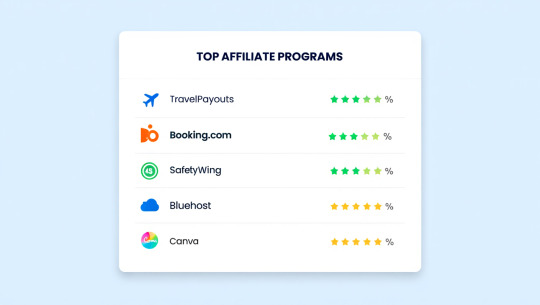
🩹 The Pain: Travel Dreams, Empty Wallet 💸
Let me paint you a picture.
You’re stuck at home, scrolling Instagram. Everyone seems to be in Portugal, Japan, or Thailand living their “best travel life.”
But here’s you:
Rent due in 3 days
Wi-Fi drops every 20 minutes
Bank account: -€3.47
You want to explore the world 🌎, but:
Flights seem expensive
You’re scared of getting scammed abroad
Mobile data? Don’t even go there 🧨

💡 The Solution: A Tactical Guide to Budget Travel in 2025
I found digital tools, insider hacks, and affiliate goldmines that changed my game. And now, I’m sharing them with you. 🧠
✈️ Cheap Flights That Actually Exist
Forget overpriced travel search engines. These platforms gave me error fares, flexible booking, and cashback:
🛬 WayAway — Cashback on flights + exclusive error fares
🌍 Kiwi — Mix & match airlines like a travel hacker
🧠 AviaSales — Meta-search magic, great for Europe

📡 Internet That Doesn’t Die in the Jungle
What do you call a digital nomad without data?
A tourist. 😅
These eSIMs saved me in every timezone:
📲 Airalo — Global eSIMs from €5
📡 Yesim — Great coverage in Southeast Asia
🌐 DrimSim — Pay-as-you-go freedom

🏨 Affordable Stays Without Sketchy Hosts
Let me be real: I once booked a room with no windows. I now triple-check with these tools:
🏠 Booking.com — Always reliable
🛏️ Agoda — Perfect for APAC
🏨 HotelLook — Searches everything at once
🛡️ Travel Insurance That’s Actually for Nomads
I used to think travel insurance was a scam… until I slipped on a rock in Thailand 🪨.
These are 100% digital, fast, and perfect for creators, nomads, and overthinkers:
💼 SafetyWing — Recurring 20% affiliate gold AND covers COVID
🧳 VisitorsCoverage — Multiple plan types for any trip
💳 Banking & Payments That Don’t Eat Your Soul
ATM fees? Currency conversion nightmares? I was done.
These saved me:
🌍 Wise — Best exchange rates
📱 Revolut — Hypothetical, but worth checking
💰 EconomyBookings — If renting cars or scooters, this site works with Wise too
🎥 BONUS: How I Created Content & Made Money While Traveling
Tools I used to automate, create, and share while eating noodles in a hut:
🎙️ FlikiAI — Convert scripts into voice & video
🎨 Canva Pro — For epic Pins, Reels, and blog banners
📹 VidFlyAI — Turn blogs into Shorts
🧠 SEOWritingAI — Content with SEO juice
🤖 Make — Connects all your apps to run automations
I even made 💸 with these affiliate platforms while on the move:
🎟️ Whop
🛍️ Printify — I sold travel mugs with memes on them
🧾 TicketNetwork — Events, festivals, concerts (great add-on income)
🧭 Final Thoughts: From Broke to Booked 🧳💰
Did I get rich overnight? Nope. But I built a system. I traveled more. I spent less. And most importantly… I started earning instead of just scrolling.
🚀 Want to Steal My Travel Toolkit?
👇 Grab it here — no spam, just 🔥 tools that work: 👉 Download the Free Travel Starter Pack
🔗 Affiliate Disclosure
Some of these links are affiliate links. I may earn a small commission (at no extra cost to you) if you choose to buy something. I only recommend what saved my butt on the road. 🙏
2 notes
·
View notes
Text
Will Donald Trump Stop Domestic Spying?
by Andrew P. Napolitano | Dec 12, 2024
During the course of an FBI written response to a Freedom of Information Act request asking about the trade names and suppliers of surveillance software the FBI had purchased, the government has yet again quietly acknowledged its antipathy to constitutional provisions that all of its employees have sworn to uphold.
Since we are dealing with software used to spy on Americans in the U.S. and abroad, the constitutional right being transgressed is the right to privacy.
This is the ancient natural right to be left alone, which the Supreme Court took 175 years to recognize as being protected by the Fourth Amendment. Since that recognition in 1965, however, notwithstanding near universal judicial acceptance of the constitutional protection of the right, the executive branch of the government has persistently negated it.
Here is the backstory.
The Fourth Amendment, which requires judicially issued search warrants based on probable cause of crime for all searches and seizures, protects the contents of devices that store data. Thus, the owners of mobile devices and desktop computers have a privacy right in the data they have stored there. Even a narrow interpretation of the amendment, which guarantees privacy in “persons, houses, papers, and effects,” must acknowledge that a computer chip is an “effect” and thus its owner enjoys this protection.
It is an allegiance to the plain language, general understanding and definitive judicial interpretations of the Fourth Amendment to which all in government have sworn.
4 notes
·
View notes
Text
Revolutionizing Transactions with PayWint Digital Wallet
In a world where convenience and efficiency dominate, the demand for reliable and feature-rich digital wallets has skyrocketed. Enter PayWint, the ultimate digital wallet solution designed to streamline your financial transactions while ensuring security and ease of use. Whether you're a student, traveler, freelancer, or small business owner, PayWint is here to revolutionize how you manage, send, and receive money.
Why Choose PayWint?
PayWint stands out in the crowded digital wallet space with its seamless features tailored to meet diverse user needs. From real-time alerts to AI-powered fraud detection, PayWint ensures your transactions are not just swift but also highly secure.
Key Features at a Glance:
Instant Money Transfers: Request, send, and receive money in real-time, making it the perfect companion for personal and professional needs.
Multi-Currency & Multi-Language Support: Operate effortlessly across borders, thanks to PayWint's global usability.
Shared Wallets: Split bills or manage group expenses with family, friends, or business partners through shared wallets.
Virtual & Physical Cards: Open a digital bank account and enjoy the convenience of virtual or physical cards.
Perfect for Everyone
PayWint caters to a diverse audience, ensuring inclusivity and functionality for all.
Students and Freelancers can use PayWint to manage international payments, ensuring they can receive funds from clients or family abroad without delays.
Small Business Owners can streamline payroll, vendor payments, and even customer transactions, all from one centralized platform.
Travel Enthusiasts can enjoy hassle-free currency conversions and transactions no matter where they are.
Unparalleled Integrations
One of PayWint's standout features is its ability to integrate with leading financial and payment platforms such as Apple Pay, Google Pay, PayPal, CashApp, and Venmo. Users can also link multiple bank accounts or credit and debit cards for effortless transactions. Moreover, businesses can integrate accounting platforms like QuickBooks, Zoho, or FreshBooks to simplify bookkeeping.
Enhanced Security & Real-Time Updates
Security is at the heart of PayWint. With encryption and AI-powered fraud detection, users can trust their financial data is always safe. Real-time alerts via text, email, or push notifications ensure you stay informed about every transaction.
Beyond Payments
PayWint isn't just a digital wallet; it's a comprehensive financial management tool. The AI-powered budget planner helps users track expenses and set financial goals. For businesses, the ability to schedule recurring payments and integrate payment widgets into websites adds unparalleled convenience.
Always There for You
With 24/7 customer support available via phone, email, text, and chat, help is always just a call or message away. You can reach us at (408) 516-1413 for any assistance. Whether it's a quick query or a technical issue, PayWint ensures you're never left in the dark.
Get Started with PayWint
Ready to transform how you handle money? Download the PayWint Digital Wallet Mobile App today from the Apple Store or Google Play Store. Alternatively, visit PayWint.com to access your financial world instantly.
2 notes
·
View notes